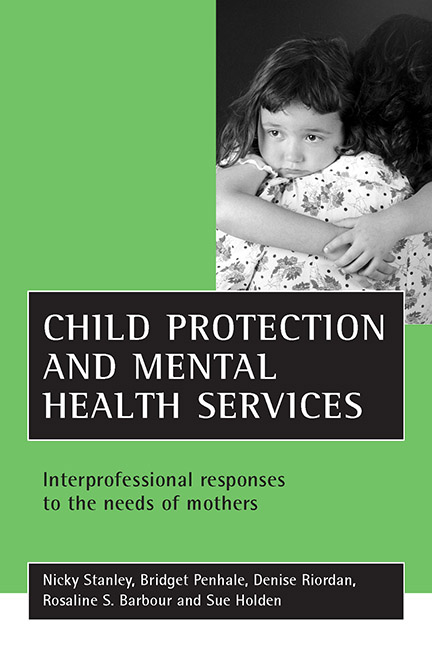Book contents
- Frontmatter
- Contents
- List of tables and figures
- Introduction
- one Mental health needs and mothering
- two The service context
- three Interprofessional work
- four The research study
- five Identifying key research issues
- six Mothers’ perspectives
- seven The mothers’ evaluations of professional support
- eight The professionals and their practice
- nine Conceptualising needs and evaluating risk
- ten Interprofessional communication and coordination
- eleven Identifying appropriate resources
- twelve Conclusion
- References
- Index
- Also available from The Policy Press
nine - Conceptualising needs and evaluating risk
Published online by Cambridge University Press: 20 January 2022
- Frontmatter
- Contents
- List of tables and figures
- Introduction
- one Mental health needs and mothering
- two The service context
- three Interprofessional work
- four The research study
- five Identifying key research issues
- six Mothers’ perspectives
- seven The mothers’ evaluations of professional support
- eight The professionals and their practice
- nine Conceptualising needs and evaluating risk
- ten Interprofessional communication and coordination
- eleven Identifying appropriate resources
- twelve Conclusion
- References
- Index
- Also available from The Policy Press
Summary
This chapter explores the ways in which the professionals surveyed in our research conceptualised mothers’ mental health needs. We were particularly interested to compare practitioners’ views with those of the mothers that we interviewed. The survey also utilised vignettes to examine practitioners’ assessments of risk in families where mothers’ mental health problems coexisted with child protection issues. This approach allowed us both to identify the key factors associated with high risk and to compare the assessments of the different professional groups surveyed. This chapter also addresses the role of training, which is often invoked as the means by which practitioners’ attitudes and skills in this area of work can be developed.
Conceptualising needs
The survey asked professionals to list what they considered to be the three most important needs of mothers with mental health problems. In response, we received a wide range of answers. These were grouped into four broad categories (Figure 9.1). Two thirds (276) identified resources to support and maintain parenting. Such resources included provision of childcare, contact with absent children, respite care, practical support, financial support and assistance with parenting skills. For instance, one practitioner described a need for “practical hands-on help with children”. Another suggested:
“appropriate care for children when experiencing particularly difficult times, eg nursery placements, childminders.”
A similar proportion (274) identified the mothers’ needs for professional intervention or treatment for their mental health problems. This cluster of responses was relatively specific and included such answers as “appropriate and effective medication and treatment” or “professional interventions such as therapy”. The mothers interviewed were less likely to emphasise their need for formal treatment, although talking therapies were valued. Some of those interviewed were unhappy about taking drugs and expressed an interest in coming off their medication.
In the third category of responses, just over half of the professionals indicated the importance of emotional support for mothers. This support, therefore, was treated as a separate category, distinct from the more practical forms of support emphasised in the first grouping, although it is necessary to be aware that ‘emotional support’ covered quite a broad spectrum in terms of the responses given. For example, some practitioners identified a need for “opportunities to talk and someone to listen and believe”, without identifying the source of support, while others focused on the role of family and friends in providing emotional sustenance.
- Type
- Chapter
- Information
- Child Protection and Mental Health ServicesInterprofessional Responses to the Needs of Mothers, pp. 83 - 92Publisher: Bristol University PressPrint publication year: 2003



